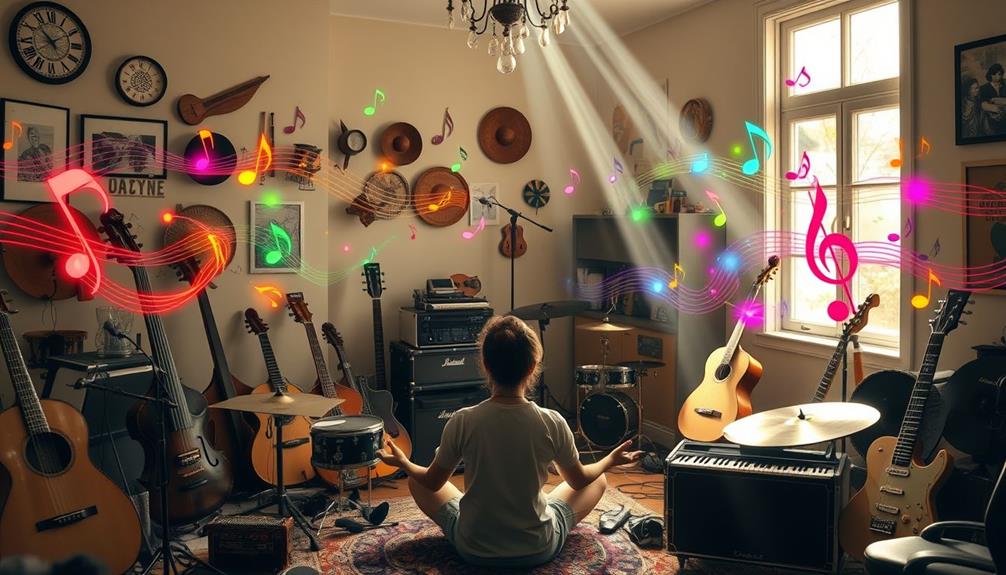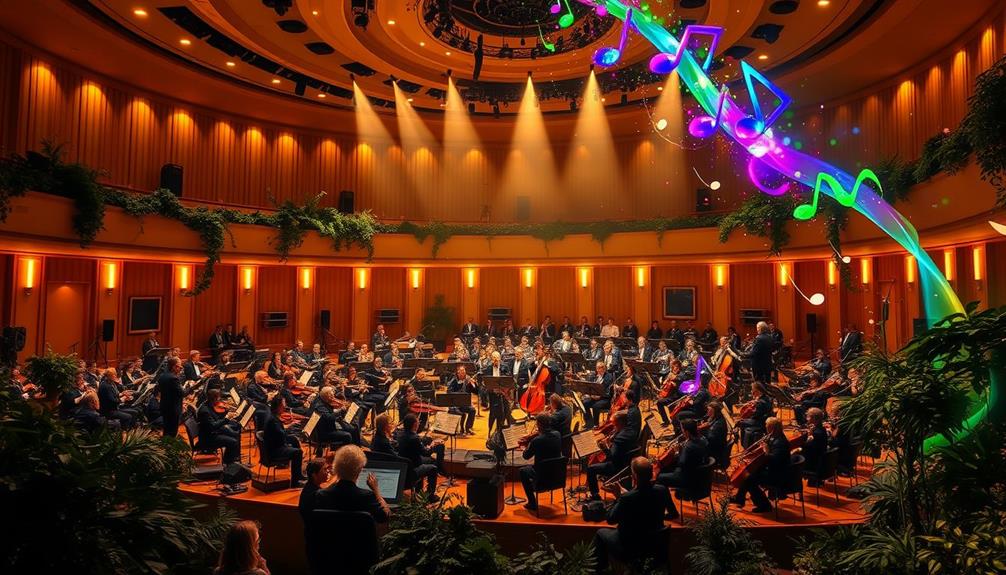Exploring the healing power of different musical genres can truly transform your emotional and cognitive well-being. Each genre offers unique benefits; for instance, classical music promotes relaxation and reduces anxiety, while upbeat pop can elevate your mood. Jazz encourages emotional release, and folk music fosters nostalgia and connection. Actively engaging with music, whether through listening or playing, leads to improved mental health and social interactions. You might find that certain styles resonate with your personal experiences, enhancing your healing journey. Keep going, and you'll discover even more about how music can support your wellness.
Key Takeaways
- Different musical genres evoke unique emotional responses, aiding in specific therapeutic outcomes for individuals seeking healing.
- Classical music is particularly effective for reducing anxiety and enhancing memory retention, making it beneficial in therapeutic settings.
- Upbeat genres like pop and rock elevate mood and energy levels, fostering a sense of joy and engagement in mental health therapy.
- Folk music promotes nostalgia and emotional healing, often creating connections to personal experiences and shared memories.
- Ambient and post-rock music provide tranquil environments that encourage relaxation, reducing anxiety and promoting emotional well-being.
The Therapeutic Benefits of Music
When it comes to mental health, music can truly lift you up and make a difference. The therapeutic benefits of music are profound, impacting your emotional well-being in ways you mightn't even realize. Engaging in music therapy has been shown to greatly reduce anxiety and depression levels.
You might find that listening to calming music helps promote relaxation and stress reduction, lowering your cortisol levels and easing tension. Additionally, incorporating practices like gentle yoga stretches alongside music can further enhance your relaxation experience and alleviate physical discomfort.
Moreover, the healing power of music extends beyond just relaxation. Active participation in music-making, whether it's singing or playing an instrument, fosters a sense of community and belonging, which is essential for mental health.
You can experience mood elevation as music stimulates the release of endorphins—those feel-good chemicals that boost happiness and emotional healing.
While music enhances cognitive function, contributing to improved memory retention, it's the emotional connection that truly resonates. By embracing the therapeutic benefits of music, you're not only supporting your mental health but also enriching your life with joy and connection.
Music's Role in Cognitive Healing

Music plays an essential role in enhancing your memory recall, making it a powerful tool for those facing cognitive challenges.
The influence of AI-generated music is reshaping how we experience and interact with melodies. By stimulating emotional connections, it can also create a more engaging learning experience, leading to improved outcomes.
Whether you're listening to a favorite song or playing an instrument, the cognitive benefits of music are undeniable.
Enhancing Memory Recall
The connection between music and memory is a powerful tool for enhancing cognitive healing. Listening to various genres, especially classical music like Mozart, can greatly boost your memory retention and recall. This stimulation of brain regions linked to memory leads to better cognitive performance, particularly during study sessions. Music therapy techniques, such as guided imagery, can aid people with cognitive impairments, making memory encoding and retrieval more effective.
Engaging actively with music—whether through playing instruments or singing—also enhances your cognitive engagement, providing therapeutic benefits for mental health. Here's a quick overview of how different musical genres affect memory recall:
| Genre | Impact on Memory Recall | Therapeutic Use |
|---|---|---|
| Classical | Improves retention & recall | Cognitive therapy |
| Jazz | Enhances problem-solving skills | Emotional therapy |
| Pop | Boosts engagement & attention | General mental health |
| Folk | Promotes emotional connections | Memory therapy |
| Rock | Stimulates active participation | Social interaction |
Utilizing music in your daily routine can be a simple yet effective method for cognitive healing and enhancing memory recall.
Stimulating Emotional Connections
Harnessing the power of music can create profound emotional connections that aid cognitive healing. Studies indicate that just as cats show signs of emotional attachment, music can evoke similar feelings of nostalgia and comfort for individuals facing cognitive challenges.
Music therapy, especially through genres like classical music, stimulates the brain's emotional regions, enhancing memory recall and cognitive function. This process is essential for individuals facing cognitive impairments, as it encourages emotional expression and fosters connections with their past.
Engaging in music-making can deepen these bonds. Here are some key benefits:
- Promotes social interaction through group activities, creating a sense of belonging.
- Enhances emotional expression, allowing individuals to articulate feelings they might struggle to verbalize.
- Supports cognitive healing by using songs to evoke memories and emotions.
- Boosts mental health by reducing feelings of isolation and stress.
Through techniques like guided imagery and lyric analysis, music therapy helps individuals process their emotions, leading to greater cognitive clarity.
As you explore different musical genres, you'll discover how they can stimulate emotional connections and ultimately contribute to your cognitive healing journey. Embrace the healing potential of music—it's not just a background soundtrack but a powerful tool for mental well-being. Creating a soothing music selection can provide a sense of calm and relaxation, which can be particularly helpful during times of stress or anxiety. Whether it’s classical, jazz, or nature sounds, finding the right music to fit your mood can be a transformative experience. Take the time to curate a playlist that speaks to your emotions and allows you to find solace and comfort in the healing power of music.
Improving Learning Outcomes
Incorporating music into your learning routine can greatly enhance cognitive healing and improve outcomes. The power of music lies in its ability to stimulate the brain, considerably boosting memory recall and retention during study sessions. For instance, classical music can help enhance retention, making it an ideal companion while you learn.
Additionally, understanding the role of loops in enhancing creativity can further enrich your study sessions, allowing for a more engaging and dynamic learning experience.
Engaging with music therapy has proven effective in increasing connectivity between auditory and emotional brain regions, which is especially beneficial for those facing mental health challenges. This connection fosters cognitive function, allowing you to improve memory and problem-solving skills.
Studies show that music can accelerate the learning of new skills, providing invaluable support in educational settings.
Moreover, incorporating music into your learning environment can lead to improved academic performance. By promoting a positive emotional state, music encourages creativity and focus, which are essential for effective learning.
Whether you're studying for an exam or mastering a new subject, the emotional support provided by engaging with music can make a considerable difference. So, don't underestimate the impact of music; it can truly transform your learning experience and help you achieve your goals.
Impact of Music on Emotions

Music has a remarkable ability to shape our emotions and influence our mood. Different genres can evoke distinct emotional responses, allowing you to explore your feelings in various ways. For instance, while classical music often promotes relaxation and meditative states, upbeat genres like pop can boost your energy and motivation.
Additionally, certain astrological attributes may enhance how we connect with specific musical styles, influencing our emotional experiences. Consider how music impacts your emotions:
- Heavy metal music can serve as an outlet for aggression, helping you process complex feelings in a cathartic manner.
- Ambient music promotes relaxation and reduces stress levels, making it effective for managing anxiety and depression.
- Folk and acoustic genres often elicit nostalgia and reflection, connecting you with shared experiences and deeper emotions.
- Dance music can elevate your mood, sparking joy and uplifting your spirit.
Research shows that listening to music activates brain regions linked to emotions, greatly reducing anxiety and depression levels.
Healing Music Genres

Healing Music Genres
Exploring the emotional impact of music naturally leads to the various genres that can aid in healing. Healing music can play a crucial role in therapeutic settings, where its relaxation effects help lower anxiety levels and foster emotional well-being.
For instance, classical music, particularly pieces by composers like Mozart and Bach, creates soothing auditory experiences that promote stress relief through calming atmospheres. Additionally, engaging in activities like safe second trimester workouts can enhance overall well-being during challenging times.
Contemporary instrumental music combines these classical elements with modern sounds, enhancing your musical experience while providing a therapeutic outlet.
Ambient and post-rock genres also excel in creating environments that facilitate relaxation, allowing you to unwind and improve your mental health.
Additionally, rhythmic blues music serves a dual purpose. It expresses pain while igniting hope, making it a powerful aid for emotional processing.
Less mainstream genres, such as Kirtan and shoegaze, offer unique therapeutic benefits, fostering emotional depth and connection that might be missing in more recognized styles.
Classical and Orchestral Influence

Classical and orchestral compositions have a remarkable ability to soothe the soul and elevate the spirit. When you immerse yourself in classical music, especially pieces by masters like Mozart and Bach, you can experience profound relaxation and a significant drop in stress levels.
This genre is particularly effective in healing environments, making it a staple in hospitals and wellness centers. Incorporating regular physical activity and mindful practices can further enhance the benefits of listening to music, supporting overall well-being and stress management techniques that contribute to emotional balance.
Consider these emotional benefits of classical and orchestral music:
- Lower anxiety levels during stressful medical procedures
- Improved sleep quality that helps you recover and rejuvenate
- Enhanced cognitive functions that boost memory retention and learning
- Positive patient outcomes in clinical settings
Listening to orchestral scores, such as those from "Schindler's List," can evoke deep emotions, facilitating catharsis and overall well-being.
Research shows that classical music can help reduce anxiety in patients undergoing cardiac surgery, proving its effectiveness in clinical settings. Additionally, the soothing qualities of these compositions not only promote relaxation but also contribute to a better recovery experience.
Engage with classical music to enhance your mental and emotional health while reaping the numerous benefits it offers.
Unconventional Healing Styles

While classical and orchestral music has long been celebrated for its therapeutic effects, unconventional healing styles are gaining recognition for their unique contributions to emotional well-being. Music can help you explore your mental and emotional landscape, providing various pathways to relaxation and reduce stress.
For instance, Kirtan promotes community connection and emotional release, creating a sense of belonging. Neoclassical music, with its soothing instrumental elements, enhances relaxation in therapeutic settings. Shoegaze invites introspection through its ethereal sound, while ambient music reduces anxiety by inducing tranquil states conducive to healing. Blues music uniquely allows you to express feelings and process pain, igniting hope and resilience.
Here's a breakdown of these unconventional styles:
| Genre | Benefits |
|---|---|
| Kirtan | Fosters community connection |
| Neoclassical | Enhances relaxation and emotional depth |
| Ambient | Reduces anxiety, promotes deep breathing |
| Blues | Provides a therapeutic outlet for pain |
These unconventional styles demonstrate the ability to promote healing in various ways, offering you diverse tools to improve your overall well-being. Embrace the power of music in your journey towards emotional healing.
Community Engagement in Music Therapy

Engaging with music therapy not only provides emotional comfort but also fosters a sense of community among patients, families, and local musicians. When you participate in community engagement through music therapy, you're contributing to a powerful healing environment that can transform lives.
This is particularly important for individuals experiencing mental health support challenges, as music can serve as a therapeutic outlet. Consider the impact of live music in these ways:
- It creates a soothing atmosphere tailored to patient preferences.
- It encourages social connections among participants, reducing feelings of isolation.
- It enhances overall well-being by promoting emotional healing.
- It invites local musicians to share their talents, enriching the therapeutic experience.
Organizations like Harmony & Healing facilitate these interactions, ensuring that music sessions resonate with the needs of patients. Your contributions, whether through donations or participation, directly support these live music programs, making a significant difference in the lives of those facing illness or grief.
Additionally, newsletters from music therapy organizations keep you informed about initiatives and events, inspiring broader community participation. By engaging with music therapy, you're not just witnessing healing; you're actively participating in it, forging connections that uplift everyone involved.
Live Music Initiatives

Live music initiatives are shaking up the way we think about patient care in healthcare settings. Organizations like Harmony & Healing offer tailored musical sessions that cater to your preferences and those of your loved ones, fostering emotional healing and a deeper connection.
You'll find that live music greatly enhances patient care by creating a soothing environment, which helps with stress reduction and improves mood, especially in hospitals and hospices. Incorporating elements of essential oils for relaxation can further amplify the calming effects of live music, creating a holistic approach to patient wellness.
These initiatives often include live musical visits, bringing comfort to patients facing illness while encouraging creativity and emotional expression among families and caregivers. You might witness firsthand how different music genres resonate with individuals, providing a unique form of therapeutic music that speaks to their experiences.
Moreover, contributing to live music programs not only enriches the lives of patients but also supports community engagement. Your support is tax-deductible and directly enhances the outreach and impact of these initiatives.
Research Supporting Music Therapy

Research consistently demonstrates the profound impact music therapy can have on health and wellness. This therapeutic approach greatly enhances emotional well-being and cognitive function, particularly for those dealing with mental health challenges like PTSD and depression.
In addition to music therapy, practices such as somatic therapy can further support emotional regulation and trauma release, showcasing the mind-body connection essential for healing.
Consider these powerful benefits of music therapy:
- Reduces pain perception across various healthcare settings, making it an effective complementary therapy.
- Lowers anxiety levels, as shown by Mindlab International's research on the calming effects of ambient music.
- Promotes relaxation and improves recovery experiences for patients undergoing surgeries, such as cardiac procedures.
- Enhances quality of life, linking active engagement in music to better mental health outcomes.
Frequently Asked Questions
What Genre of Music Is Most Healing?
The most healing genre of music varies for you. If you crave calmness, classical or ambient tunes might help. For motivation, try pop or dance. Ultimately, it's about finding what resonates with your emotions.
What Type of Music Helps You Heal?
When you seek healing through music, try listening to classical compositions for relaxation, upbeat pop for mood boosts, or soulful blues to navigate emotions. Each genre can uniquely support your journey towards emotional well-being.
How Would You Describe the Healing Power of Music?
Imagine a gentle breeze carrying soothing melodies that wrap around you like a warm blanket. Music's healing power lifts your spirits, calms your mind, and ignites your soul, transforming emotions and restoring balance in your life.
What Is the Best Genre of Music for Mental Health?
The best genre for mental health depends on your mood. If you need relaxation, try classical music. For a boost, upbeat pop can uplift you. Explore various styles to find what resonates with you personally.
Conclusion
In exploring the healing power of music, you've likely discovered that different genres can profoundly affect your well-being. As the saying goes, "music soothes the savage beast," illustrating its ability to calm our emotions and foster healing. Whether through classical melodies or unconventional styles, tapping into music's therapeutic benefits can enhance your mental and emotional health. Embrace these sounds, engage with your community, and let the rhythms guide you on your healing journey.










